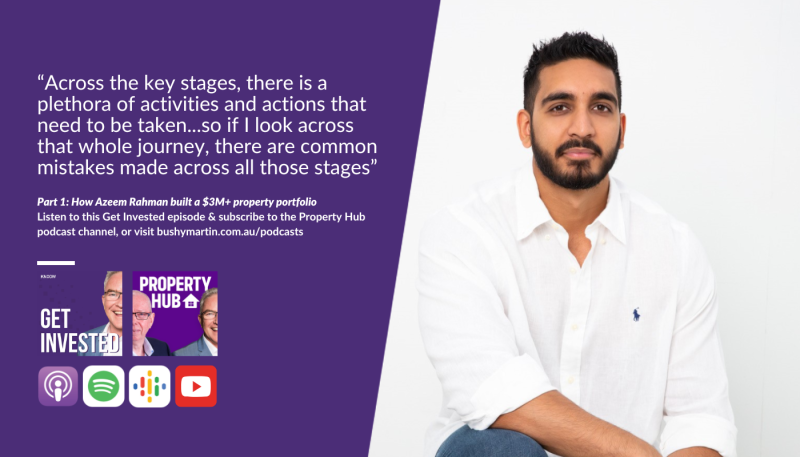Azeem Rahman reveals the common mistakes made by investors with their strategy, property selection, offers and post-purchase.
Starting at the age of 24, Azeem has successfully built a $3 million plus property portfolio without a formal education or mentorship.
On the Get Invested podcast, Azeem delved into his strategic and calculated approach which allowed him to avoid the common but critical mistakes made by investors across the different stages of their property investment journey.
Common mistakes at Stage 1: Strategy
The first mistake investors can fall in to is starting the property investing process without a strategy.
“The mistake here that I’ve come across in not just the common, everyday real estate investors, but also the professionals in the industry, is that they don’t have a strategy. There are very few who could confidently say to me that we have a strategy that is also documented, so I think that’s the first thing that’s completely missed. Instead, they’ll just go straight to figuring out which property to purchase after they know how much they can borrow,” Azeem said.
Common mistakes at Stage 2: Suburb Selection and Stage 3: Location Selection
Azeem said suburb and location selection should be based upon reliable data and market insights.
‘In the second stage, which is the suburb selection, and the third stage, which is the location selection, the common mistake I see that’s made by investors is they don’t to rely on data. So there’s a great amount of data that needs to be relied upon and researched and analyzed to understand which are the right suburbs, and then which are the right pockets within those suburbs as well too. And it’s a combination of science and art, quantitative and qualitative data. So I think that whole data piece is completely missing, or they only have one side of the cube and they only have a one-dimensional view on it. So they’re not looking at it multi-dimensional,” he said.
Common mistakes at Stage 4: Property Selection
Azeem explained the main mistake in Stage 4 is investors being unsure of non-negotiable factors.
“Where I find that investors make a mistake is they don’t have a clear criteria of what are the non-negotiables, both external factors and then the internal factors, because you need to ensure that there’s appeal in the short term for your tenants but then long-term appeal for owner occupiers when you decide to sell. So I think that criteria is not there. investors do have an idea. I had an idea when I started too, but it’s not a comprehensive view of what exactly am I looking for and what are the non-negotiables,” he said.
Common mistakes at Stage 5: Offers
The last step investors stumble on before purchasing a property is their final offers.
“The common mistake with the offer is that it’s just not on par with what truly is the value of the property. So they’re either lowballing the offer and they’re missing out on good opportunities, or they’re overpaying. And the reason why they’re overpaying or they’re under offering and not getting the property is purely because they don’t know how to value the property itself,” Azeem said.
Common mistakes at Stage 6: Post-purchase
Following the successful purchase of a property, investors can suffer when they’re not prepared for the inevitable repair and maintenance costs.
“A mistake in particular that I find with investors who already have purchased an investment is they don’t factor in repair and maintenance. The reality is there’s always going to be repair maintenance to some degree. Even if it’s a newly built property, there still will always be wear and tear. Something will always happen, so you need to be obviously having some money set aside for that,” Azeem said.
He also warned that investors shouldn’t blindly trust their property manager.
“This is a mistake that existing investors make, and that’s not to say that if your property manager is making mistakes that means that they’re not competent. It can just simply mean the case of they’re just human and they make errors, or systems can come up with some situations that cause issues. But I think if you’re coming with the mindset as a business owner and you could dedicate a little bit of time to check all the documentation, the information, and that the numbers are correct, well it pays to do so. I’ve personally found that, even with the best property managers and agencies, sometimes mistakes are made and it’s not their fault. Sometimes errors happen and glitches happen. However, if you’re not taking the time to look at it, then you’re leaving your money on the table,” he said.
Listen to the full interview here.
Want to Know How you can build wealth and optimise your property finance with the help of leading, qualified experts? Check us out and talk to the team, now.




